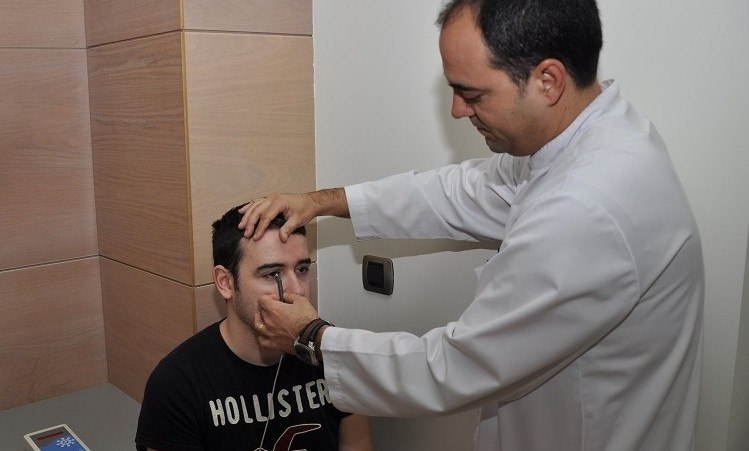
Pachymetry is a technique that allows analyzing the thickness of the cornea, the layer of the eye that lets in the external light and protects the iris and the crystalline lens.
There are different instruments or pachymeters to analyze it, such as the traditional optical pachymeter (OCP) or the advanced ultrasonic pachymeter.
This test is usually used in the study of keratoconus and glaucoma. It is also important to decide which is the best refractive surgery technique for each patient.
Measuring the thickness of the cornea provides a lot of information in ophthalmology, since the doctor can relate this information to the results of intraocular pressure tests. Pachymetry, therefore, is done for the diagnosis and detection of keratoconus and is essential in refractive surgery. It is also used to monitor different pathologies such as corneal ectasia, Fuchs’ dystrophy and glaucoma.
In case the test is performed for a preoperative refractive surgery and you use hard contact lenses, you must stop wearing them for 8 days before the test. If you wear soft lenses, it is enough to stop wearing them 5 days before the test. If you do not wear contact lenses, the technique does not require any prior preparation.
Ultrasonic pachymetry is a simple, quick test that does not cause discomfort or blurred vision. Therefore, after the test you can safely continue your daily activities without any problem. If you wear contact lenses, you can put them back in 30 minutes after the test.
Ultrasonic pachymetry requires the administration of an anesthetic drop in each eye, which produces its effect for 15 minutes. The thickness of the cornea is then measured through contact between an ultrasonic probe and the eye. These measurements are monitored and the results are obtained instantly.
Once the data is collected, the ophthalmologist will be in charge of interpreting the results and transmitting them during the next visit.
The department in charge of performing the test is the Optometry Department, which performs all the ophthalmological tests necessary for the diagnosis and follow-up of the different ocular pathologies and the entire visual system. The Department has the most advanced diagnostic equipment and the most modern technology, and its nearly 50 optometrists are specifically trained to perform these tests.
Pachymetry does not cause any discomfort, since a drop of anesthesia is applied to the eye to avoid any sensation of discomfort.
No, this test does not require you to be accompanied by another person.
No, you do not need to fast for the test.
The data are obtained at the same time the test is taken. If an ophthalmologist’s report is required, the reported test will be returned within a few days.
The optometrist is the one in charge of performing the test and has the knowledge to confirm its correct performance. The one who has to interpret and report the results obtained is the ophthalmologist, who will do it having the clinical context after a complete anamnesis and examination of the patient.
The normal values in this test are not exact figures. They cannot be determined by interpreting the test alone. The ophthalmologist interprets them in the context of the patient’s symptoms and ophthalmologic examination.
Yes, after the test it is possible to carry out any day-to-day activity, such as driving or showering.
Refractive surgery consists of eliminating the diopters that cause myopia, hyperopia or astigmatism by thinning the cornea. For this reason, if there is not enough corneal thickness, it is not possible to operate or eliminate all the necessary diopters.
Contact us or request an appointment with our medical team.